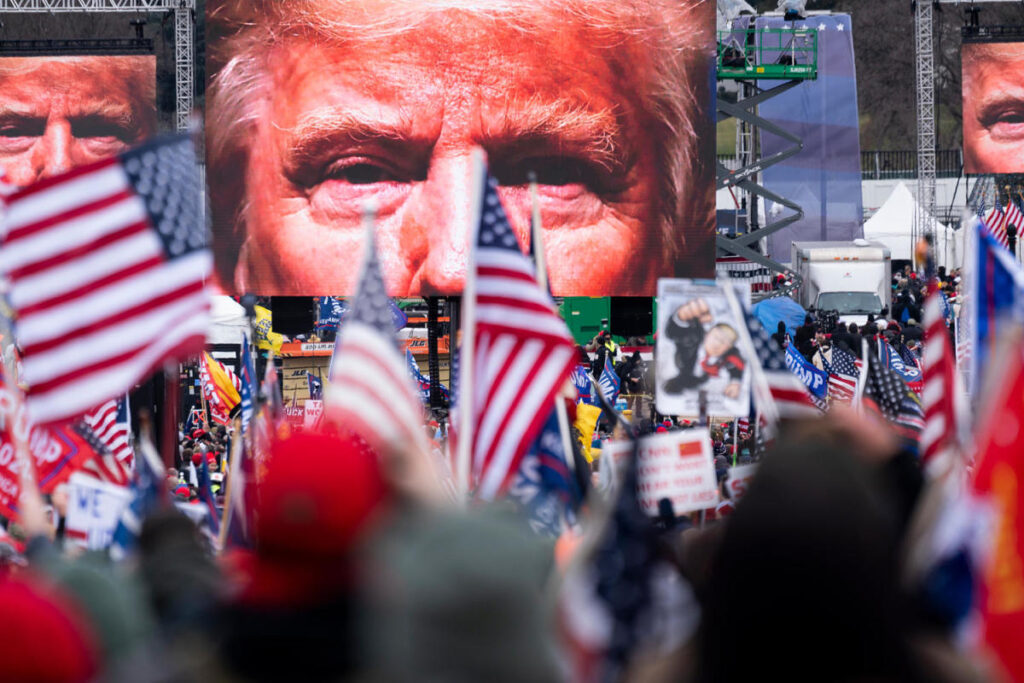President-elect Donald Trump’s recent appearance on “Meet the Press” has raised alarm bells among allies and critics alike regarding his grasp of the ongoing investigation into the Capitol riot, which has resulted in over 1,100 convictions stemming from the events of January 6. Trump, just weeks away from taking office, indicated that he would likely start pardoning those convicted in connection to the Capitol attack almost immediately. In an interview with Time magazine, he stated, “I’ll be looking at J6 early on… We’re going to look at each individual case… and a vast majority of them should not be in jail.” However, his remarks have prompted questions about his understanding of the cases involved, given the large number of defendants and the diminishing coverage of proceedings over the years.
Many sources—including Trump allies, proponents of January 6 defendants, and law enforcement officials—suggest that Trump’s comments reflect a lack of awareness regarding current situations surrounding the January 6 cases. With over 1,500 individuals charged and more than 600 sentenced, Trump’s expressed intention to “act very quickly” on pardons came off as being uninformed, especially as he appeared to conflate the imprisonment conditions of defendants. Only a limited number remain in custody in Washington, while others are distributed in federal prisons across the country. The Trump transition team reportedly lacks a cohesive strategy for pardoning these individuals, highlighting the need for a well-defined argument to support such actions to the public.
Insights into Trump’s possible pardon plans suggest that he is considering selective pardons rather than a blanket approach for all participants in the Capitol attack. Some sources within the transition team indicate there is a thorough vetting process in place for a select group of defendants deemed “worthy” of a pardon, rather than an immediate, sweeping action. The involvement of figures like Ed Martin, a conservative activist close to Trump who has engaged with organizations supporting January 6 defendants, points to a wider effort in discussing these pardons. However, there are concerns that such discussions have not yet translated into a formalized procedure within the Trump administration.
The nature of the pardons has raised additional questions about the specifics of cases against individuals involved in the January 6 violence. Numerous defendants were caught on tape engaging in violent acts against law enforcement, raising issues about the appropriateness of potential pardons. Some defendants have access to prominent legal representation that seems optimistic about the extent of forthcoming pardons; however, no structures presently exist for processing those pardons. The overall sentiment among legal professionals in alignment with the January 6 defendants indicates that they expect Trump to deliver on his campaign commitments regarding pardons, though a lack of clarity remains.
Another highlighted concern among Trump’s allies relates to his reliance on outdated conspiracy theories concerning individual cases and the overall events of January 6. His commentary on individuals like Ray Epps—who was previously accused of acting as a federal agent—exemplifies a disconnect from the realities of ongoing legal proceedings. In fact, Epps had already faced legal ramifications for his actions during the riot, leading to probation while Trump seemingly misrepresented the situation during the interview. Such repeated invocations of conspiracy theories and misconceptions contribute to an overall hesitance among Trump’s inner circle about how these narratives may affect public perception of his commitment to pardons.
Despite concerns regarding Trump’s awareness and comments about the January 6 investigation, officials within the Justice Department indicated determination to continue their work unabated. There remains a strong belief among prosecutors in the integrity of their convictions, regardless of potential presidential pardons. The unwavering commitment to carrying out their legal duties contrasts with the worries expressed about how Trump’s perceived ignorance could complicate his presidency as it relates to the Capitol riot. Understanding that the records of prosecution and conviction exist, they remain resolute in continuing their efforts until any administrative changes dictate otherwise, demonstrating a spirit of resilience against the backdrop of political shifts.

